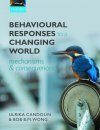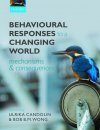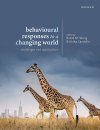About this book
Human-induced environmental change currently represents the single greatest threat to global biodiversity. Species are typically adapted to the local environmental conditions in which they have evolved. Changes in environmental conditions initially influence behaviour, which in turn affects species interactions, population dynamics, evolutionary processes and, ultimately, biodiversity. How animals respond to changed conditions, and how this influences population viability, is an area of growing research interest. Yet, despite the vital links between environmental change, behaviour, and population dynamics, surprisingly little has been done to bridge these areas of research.
Behavioural Responses to a Changing World is the first book of its kind devoted to understanding behavioural responses to environmental change. The volume is comprehensive in scope, discussing impacts on both the mechanisms underlying behavioural processes, as well as the longer-term ecological and evolutionary consequences. Drawing on international experts from across the globe, the book covers topics as diverse as endocrine disruption, learning, reproduction, migration, species interactions, and evolutionary rescue.
Contents
Foreword / Nick Davies
Introduction / Ulrika Candolin and Bob Wong
PART I: Mechanisms
1. Understanding behavioural responses and their consequences / Andrés López-Sepulcre and Hanna Kokko
2. Environmental disturbance and animal communication / Gil G. Rosenthal and Devi Stuart-Fox
3. The endocrine system: can homeostasis be maintained in a changing world? / Katherine L. Buchanan and Jesko Partecke
4. Experience and learning in changing environments / Culum Brown
PART II: Responses
5. Dispersal / Alexis S. Chaine and Jean Clobert
6. Migration / Phillip Gienapp
7. Foraging / Ronald C. Ydenberg and Herbert H.T. Prins
8. Reproductive behaviour / Anders Pape Møller
9. Social behaviour / Daniel T. Blumstein
10. Species interactions / Shelley E.R. Hoover and Jason M. Tylianakis
PART III: Implications
11. Behavioural plasticity and environmental change / Josh Van Buskirk
12. Population consequences of individual variation in behaviour / Fanie Pelletier and Dany Garant
13. Ecosystem consequences of behavioural plasticity and contemporary evolution / Eric P. Palkovacs and Christopher M. Dalton
14. The role of behavioural variation in the invasion of new areas / Ben L. Phillips and Andy Suarez
15. Sexual selection in changing environments: consequences for individuals and populations / Ulrika Candolin and Bob Wong
16. Evolutionary rescue under environmental change? / Rowan D.H. Barrett and Andrew P. Hendry
17. Ecotourism, wildlife management, and behavioural biologists: changing minds for conservation / Richard Buchholz and Edward M. Hanlon
Index
Customer Reviews
Biography
Ulrika Candolin is lecturer in ecology and evolutionary biology at the University of Helsinki, Finland. She received her PhD in 1998 from the University of Turku, Finland. Prior to her current appointment, she was senior lecturer at Department of Ecology and Evolution at Uppsala University, Sweden. Candolin has published over 40 peer-reviewed articles and book chapters, which have been cited more than 1000 times. Her work focuses on behavioural responses to human-induced environmental change, with an emphasis on sexually selected behaviours. Candolin has served as a member of the editorial board of Evolution and the Journal of Fish Biology.
Bob Wong is a senior lecturer in behavioural and evolutionary ecology at Monash University, Australia. Wong received his PhD from the Australian National University in 2004 and has published over 40 peer-reviewed articles. Wong's research is mostly within the area of sexual selection and speciation, with recent papers exploring the impact of anthropogenic disturbance on animal mating systems and behaviour. His research has received considerable interest in the international press. He has given invited seminars in Australia, Europe and North America, and is currently serving as a reviews editor for the Journal of Evolutionary Biology.




































